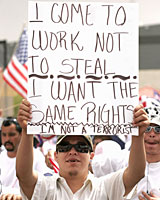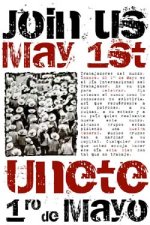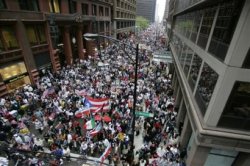May Day 2008
There will be a time when our silence will be more powerful than the voices you strangle today!
–Last words of August Spies (1887-11-11), immigrant, anarchist, and Haymarket martyr
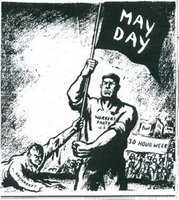
Fellow workers:
Today is May Day, or International Workers’ Day, a holiday created by Chicago workers–most of them anarchists–to honor the memory of the Haymarket martyrs and to celebrate the struggle of workers for freedom, for a better life, and for control over the conditions of their own labor. It was created during the radical phase of the struggle for an eight-hour day: after legislative campaigns by the Knights of Labor and the National Labor Union failed, labor radicals in Chicago — organizers like Albert Parsons, Lucy Parsons, August Spies — declared that workers should take matters into their own hands, in the form of direct action on the shop floor. Workers would no longer try to get an eight-hour day by promising a useful and compliant voter base in return for patronage from politicians. To get an eight-hour shift, workers would make their own: in many shops, workers in the International Working People’s Association would bring their own whistle to work and blow it at the end of an eight hour shift — at which point most or all of the workers on the floor would just get up and just walk off, like the free people they were, whether or not the boss demanded more hours of labor. At the height of the struggle, they organized a General Strike, in defiance of the bosses and in spite of repeated violence from the Law.
Today is also the third annual day of rallies, strikes and marches against the criminalization of immigrant workers. A day which immigrant workers have chosen for actions against the bigotry of nativist bullies, the violence of La Migra, and the political system of international apartheid, as contemptible as it is lethal. A day to proudly proclaim We are not criminals
and We are not going anywhere,
to demand the only political program that recognizes it — open borders and unconditional amnesty for all undocumented workers.
And it is a joy for me to read that today is also a day of strikes against the bosses’ war in Iraq, which will shut down all the sea ports on the west coast of the United States, as an act of defiance against the State war machine and against the worthless political opportunists who promise to end it while voting, over and over again, to sustain it:
Amid this political atmosphere, dockworkers of the International Longshore and Warehouse Union have decided to stop work for eight hours in all U.S. West Coast ports on May 1, International Workers’ Day, to call for an end to the war.
This decision came after an impassioned debate where the union’s Vietnam veterans turned the tide of opinion in favor of the anti-war resolution. The motion called it an imperial action for oil in which the lives of working-class youth and Iraqi civilians were being wasted and declared May Day a
no peace, no workholiday. Angered after supporting Democrats who received a mandate to end the war but who now continue to fund it, longshoremen decided to exercise their political power on the docks.
The Longshore workers have the explicit support of postal workers in New York and San Francisco, and I hope this will be only the beginning of ongoing, widespread industrial action to end a war that political action — even after two election cycles, after hundreds of millions of dollars, after countless hours of lobbying and electioneering, after a change in government, and with the backing of an overwhelming supermajority of the populace — has proven completely incapable of ending.
This is May Day as it is and ought to be. A Day of Resistance against the arrogance and power of bosses, bordercrats, bullies, and the Maters of War, who would harass us, intimidate us, silence us, exploit us, beat us, jail us, deport us, extort us, and do anything else it takes to stop us from coming into our own. A day to celebrate workers’ struggles for dignity, and for freedom, through organizing in their own self-interest, through agitating and exhorting for solidarity, and through free acts of worker-led direct action to achieve their goals, marching under the banners of We are all leaders here
and Dump the bosses of your back.
A day to remember:
There Is Power In A Union
There is power, there is power,
In a band of working folk,
When we stand
Hand in hand.–Joe Hill (1913)
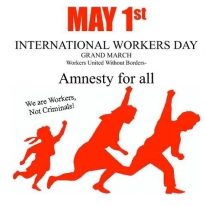
Radio Biling?@c3;bc;e has a list of immigration marches and rallies across the country today. I plan to be at the mitin in Las Vegas tonight:
- Las Vegas immigrant rights mitin (rally)
- Tonight, May 1, 2008, 7:00 PM
- Federal Courthouse, 333 Las Vegas Blvd S.
Meanwhile, in the news, some useless idiot is wandering around Washington proclaiming Law Day
, accosting hundreds of millions of complete strangers to tell them to put on ceremonies
in praise of his own power to do the beating, jailing, deporting, etc. In Istanbul, organized workers marched to Taksim Square in defiance of the Turkish government, which has declared their free assembly illegal,
and which has deployed government riot cops to attack them with firehoses and tear gas. In Harare, organized workers are holding rallies today to call attention to the devastating effect of the government’s hyperinflationary money monopoly on workers’ wages–and an apparatchik of the Zimbabwean government–one of the most violently anti-worker governments in the world–is taking the opportunity to wear a concerned expression and assure that Government would at all times endeavour to make sure that workplaces were monitored through inspections to minimize hazards that might injure or kill them.
(No word yet on whether the hazards
the inspectors will be inspecting for include the Zimbabwe Republic Police or the Central Intelligence Organization.) We must never forget what this band of creeps and fools is doing their best to remind us of — that the State is the most deadly weapon of our enemies, and that it is a weapon that we will never be able to wield for ourselves without chaining ourselves to politics and destroying the very things we meant to fight for.
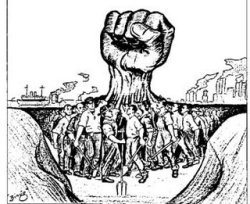
In this season and in these days, in the midst of Babel during its most raucous festival–when so much of what we see and hear are the endless shouts of professional blowhards who know of no form of social change other than political change, and who know of no site of political change other than the gladiatorial arena of electoral politics, and who seem to know of no form of electoral politics other than polling, horse-trading, and endlessly shouting about a series of nomenklatura-contrived issues,
which boil down to little more than a media-facilitated exchange of racist, sexist, ageist, and authoritarian barbs among the nomenklatura-approved serious candidates
–it’s important to remember that, in spite of all the noise and spectacle, the most significant events for labor and for human freedom are happening in the streets of cities all over the country and all over the world, where workers are organizing among themselves, demanding their rights, fighting for their lives, and defying or simply bypassing the plutocrats and their so-called laws. In the U.S.A., while the punch-drunk establishmentarian labor movement reels from one failure to another, some of the most dynamic and successful labor struggles in the past few years have been fought by a grassroots union organized along syndicalist lines without NLRB recognition, using creative secondary boycott tactics which would be completely illegal if they had submitted to the regulatory patronage of the Wagner-Taft-Hartley system. There is a lesson here–a lesson for workers, for organizers, for agitators, and anti-statists. One we’d do well to remember when confronted by any of the bosses–whether corporate bosses or political, the labor fakirs and the authoritarian thugs styling themselves the vanguard of the working class, the regulators and the deporters and the patronizing friends of labor
all:
Dump the Bosses Off Your Back
Are you cold, forelorn, and hungry?
Are there lots of things you lack?
Is your life made up of misery?
Then dump the bosses off your back!–John Brill (1916)
Happy May Day, y’all.
Elsewhere Today:
- Scott McLemee, Crooked Timber 2008-04-30: All Out for May Day
- Gulf Stream Blues 2008-05-01: Labour Movements Cry
Mayday!

